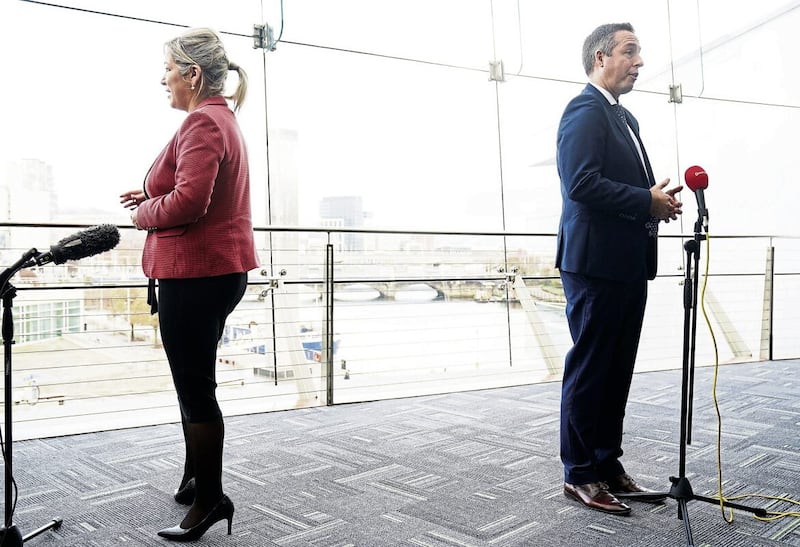A few days ago, Naomi Long wrote to Micheál Martin and Simon Harris, in their roles as ‘co-guarantors of the peace process’, and asked them to join with the UK government to ‘reopen a serious dialogue’ about reform of the assembly.
Martin has already spoken on a number of platforms – including last year’s Alliance party conference – about the case for reform and does seem to accept that political/electoral/societal change since 1998 is not reflected in how the assembly works.
But reform of assembly/executive structures and mechanics – which were touched upon in the 2020 New Decade, New Approach deal – will not, necessarily, be enough to prevent all sorts of other potential problems.
Let’s face it, two years after that deal, which contained quite a lot about ‘sustainability of the institutions… and functioning of the executive’, everything was collapsed again by the DUP, which hoped to pressurise the government into delivering for it on the Windsor Framework.
And while neither the DUP nor UUP are keen to collapse again over the refusal of the government to trigger the Stormont Brake, there are absolutely no guarantees that ‘events, dear boy, events,’ won’t lead to downfall much sooner than expected.

The other thing that reform will not and indeed cannot address is the fact that Northern Ireland appears to be broken right now.
That has nothing to do with the mechanics of governance: instead, it has everything to do with the inability of the executive parties, of which Alliance is one, to collectively agree a costed, coherent programme for government.
You can have one priority or maybe two, three or four. What you cannot have is a list of priorities as long as the longest-armed member of the executive, because then all you have is a list of things that need done.
And there is an exceptionally long list of things which need to be done; a list that the executive needs to prioritise and, bit by bit – and it will maybe take a couple more mandates – address and resolve them one by one.
Fixing Northern Ireland matters more than fixing the mechanics of the executive or assembly. Fixing Northern Ireland is THE priority.

It doesn’t require a dialogue with the British or Irish governments to get to work on that priority, either. It requires the executive parties to accept that fixing can’t be done in one fell swoop: it will be a long haul which, in turn, means that you begin with the most important and keep on going.
It also means that you don’t divvy out priorities to each party just for the optics. You add up what’s available in terms of immediate and longer-term funding and calculate how it is best spent.
Something for the DUP, something for Sinn Féin, something for Alliance and something for the UUP is the worst possible way of allocating.
Take health, for example. There’s never going to be enough money. That’s both a brutal and a simple fact.
As Vernon Bogdanor noted in his recent book, Making The Weather, “If a service is free of charge to the users, demand will always exceed supply. Rationing will be achieved through waiting lists, and demand in the health service will be reduced by patients not wanting to ‘bother the doctor’, often at some cost to their health.”
Bogdanor also noted that “…devolution does seek to remedy another flaw in Bevan’s conception of the health service, which yielded an over-centralised and top-heavy monolith unresponsive to the public and with insufficient incentives to provide high-quality services".
But it is clear, looking at the evidence from Scotland, Wales, Northern Ireland and some devolution experiments in parts of England, that devolving responsibility for health to ‘local’ ministers and administrations hasn’t resulted in solving the permanent cash crisis.

That’s because it cannot be resolved by the present funding models; and no new funding model will satisfactorily address the always growing demand.
Since the first executive was formed in December 1999, we have been told that health is the priority; which is why it receives 50%+ of the available budget.
Yet 26 years on the ‘priority’ is in a dreadful state of disrepair, chronically underfunded and incapable of meeting demand.
There’s no point in trying to allocate blame: but nor is there any point in continuing to throw money at it in the absence of a clinical and extraordinarily difficult prioritisation of where and how the money is spent.
Reforming the assembly won’t address that issue. It won’t address the “…terrible state o’ chassis” which hangs over so many of the problems which the executive is supposed to have prioritised, addressed and set on the path to resolution.
So, maybe we could step away from the unnecessary focus on reforming the institutions and focus, instead, on reforming how we think about the problems multiplying all around us.




